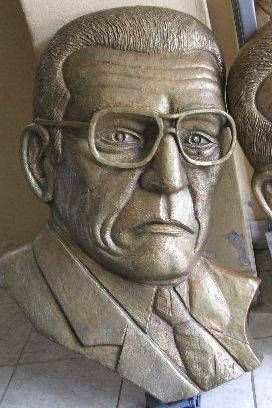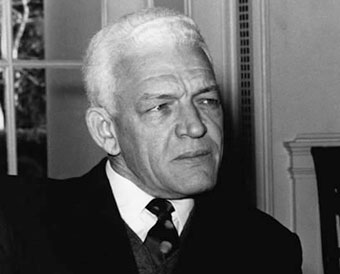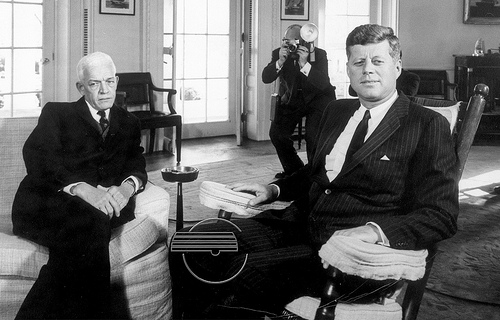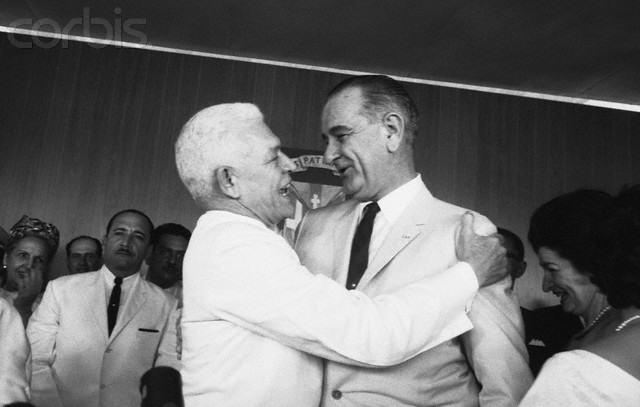<Back to Index>
- Astronomer Jean Dominique, comte de Cassini, 1748
- Composer Riccardo Eugenio Drigo, 1846
- President of the Dominican Republic Juan Emilio Bosch Gaviño, 1909
PAGE SPONSOR
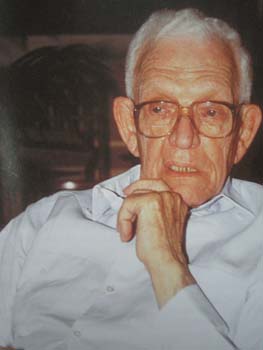
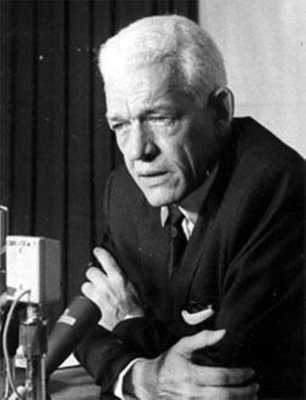
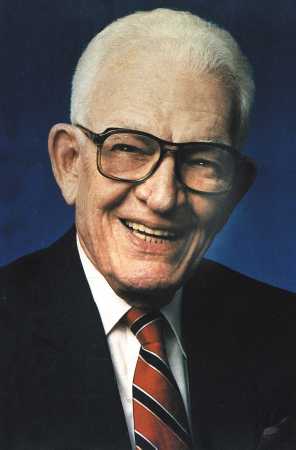
Juan Emilio Bosch Gaviño (30 June 1909, La Vega – 1 November 2001, Santo Domingo) was a politician, historian, short story writer, essayist, educator, and the first cleanly elected president of the Dominican Republic for a brief time in 1963. Previously, he had been the leader of the Dominican opposition in exile to the dictatorial regime of Rafael Trujillo for over 25 years. To this day he is remembered as an honest politician and regarded as one of the most prominent writers in Dominican literature. He is the founder of both the Dominican Revolutionary Party (PRD) in 1939 and the Dominican Liberation Party (PLD) in 1973.
In
1934 he married Isabel García and had two children with her:
Leon and Carolina. As Trujillo's dictatorship was getting stronger and
meaner, Bosch was jailed for his political ideas, being released after
several months. In 1938, knowing that the tyrant wanted to buy him with
a position in the Congress, Bosch managed to leave the country,
settling in Puerto Rico. By 1939 Bosch had gone to Cuba, where he directed an edition of the completed works of Eugenio María de Hostos, something that defined his patriotic and humanist ideals. In July, with other Dominican expatriates, he founded the Partido Revolucionario Dominicano (PRD), which stood out as the most active front against Trujillo outside the Dominican Republic. Bosch
heavily sympathised with leftist ideas, but he always denied any
communist affiliation. He collaborated with the Cuban Revolutionary
Party and had an important role in the making of the Constitution that
was promulgated in 1940. Bosch
married for the second time, this time a Cuban lady, Carmen Quidiello,
with whom he had two more children, Patricio and Barbara. At the same
time, his literary career was ascending, gaining important
acknowledgments like the Hernandez Catá Prize in Havana for
short stories written by a Latin American author. His works had a deep
social content, among them "La Noche Buena de Encarnación
Mendoza", "Luis Pié", "The Masters" and "The Indian Manuel
Sicuri", all of them described by critics as masterpieces of the sort. Bosch was one of the main organizers of the 1949 military conspiracy that landed in Cayo Confites in
the north coast of the Dominican Republic, to overthrow the
dictatorship of Trujillo. However, the expedition failed, and Bosch
fled to Venezuela, continuing his anti - Trujillo campaign. In Cuba,
where he returned by requirement of his friends in the Authentic
Revolutionary Party, he played a notorious part in the political life
of Havana, being recognized as a promoter of social legislation and
author of the speech pronounced by President Carlos Prío Socarrás when the body of José Martí was transferred to Santiago de Cuba. When Fulgencio Batista led a coup d'etat against
Prío Socarrás and took over the presidency in 1952, Bosch
was jailed by Batista's forces. After being liberated, he left Cuba and
headed to Costa Rica, where he dedicated his time to pedagogical tasks, and to his activities as leader of the PRD. In 1959 the Cuban Revolution took place, led by Fidel Castro,
causing a major political, economic and social upheaval in the
Caribbean island. Bosch accurately perceived the process that had begun
from those events, and wrote a letter to Trujillo, dated February 27,
1961. He told Trujillo that his political role, in historical terms,
had concluded in the Dominican Republic. After
23 years in exile, Juan Bosch returned to his homeland when Trujillo
was assassinated on May 30, 1961. His presence in the national
political life, as the Dominican Revolutionary Party presidential
candidate, was a fresh change for the Dominicans. His manner of
speaking, direct and simple, especially when addressing the lowest
classes, appealed the farmers as much as the people from the cities.
Immediately he was accused by the Church and by conservatives of being
a communist, but in the electoral match of December 20, 1962, Bosch
obtained a sweeping triumph over his main oppositor Viriato Fiallo of
the National Civic Union, in what is acknowledged to be the first free election in the country's history. On
February 27, 1963, Juan Bosch and Armando González Tamayo took
office as the new President and Vice President of the Dominican
Republic, in a ceremony that was attended by important democratic
leaders and personalities, like Luis Muñoz and José Figueres. Bosch
immediately launched a deep restructuring of the country. On April 29,
he promulgated a new liberal constitution. The new document granted the
people freedoms they had never known. Among other things, it declared
specific labour rights, and mentioned unions, pregnant women, homeless
people, the family, rights for the child and the young, for the
farmers, and for illegitimate children. However, Bosch faced powerful enemies. He moved to break up latifundia, drawing the ire of landowners. The Roman Catholic Church thought Bosch was trying to oversecularize the country. Industrialists did not like the new Constitution's guarantees for the working class. The military, who previously enjoyed free rein, felt Bosch put them on too short a leash. In addition, the United States was skeptical of even a hint of left leaning politics in the Caribbean after Fidel Castro openly declared himself a Communist. On September 25, 1963, after only seven months in office, Bosch was overthrown in a coup led by Colonel Elías Wessin and replaced by a three man military junta. Bosch went back to exile in Puerto Rico. Less
than two years later, growing dissatisfaction generated another
military rebellion on April 24, 1965, that demanded Bosch's restoration. The insurgents, commanded by Colonel Francisco Caamaño,
removed the junta from power but was defeated on April 28, with United States
assistance in the civil war dispatching 42,000 troops to the island. An
interim government was formed, and elections were fixed for July 1,
1966. Bosch returned to the country and ran as his party's presidential
candidate. However, he ran a somewhat muted campaign, fearing for his
safety and believing he would be thrown out of office by the military again
if he won. He was soundly defeated by Joaquín Balaguer, who garnered 57% of the vote. During
the last half of the 1960s, Bosch remained a very prolific writer of
essays, both political and historical. He published some of his most
important works during this time: "Dominican Social Composition",
"Brief History of the Oligarchy in Santo Domingo", "From Christopher
Columbus to Fidel Castro", and numerous articles of different sorts. By
1970, Bosch had the intention of reorganizing the PRD, and turning its
members into active, studious militants of the historical and social
reality of the country. His project was not accepted by most of the
PRD, most of whose members were turning in a more mainstream social
democratic direction. Also, given the military repression, and lack of
political equality between the PRD and the official Reformist Party,
Bosch abstained from the 1970 elections. The
differences and contradictions between Bosch and an important sector of
the PRD, as well as the corruption that had started to grow within the
party, made him leave the organization in 1973, and thus he founded the Dominican Liberation Party (PLD) on December 15 of that same year. Later
he ran unsuccessfully for president as the PLD candidate in 1978, 1982,
1986, 1990, and 1994. He came closest to winning in 1990, but there
were serious allegations of fraud against Balaguer. After placing third in the 1994 election, Bosch retired from politics. He was already 83 years old and presumably suffering from Alzheimer's disease.
In 1996 he was practically carried to the consolidation of the
"Patriotic Front", an alliance between the PLD and his lifelong
opponent Balaguer, as part of the latter's plan to defeat the PRD in
the next presidential election. Juan
Bosch died on November 1, 2001, in Santo Domingo. As a former
President, he received the corresponding honors at the National Palace,
and was buried in his hometown of La Vega. To this day, he is remembered as a man of principles.
Over the years, as his luck rose and fell, his political direction
oscillated wildly. He described himself as a "non - Communist" and a
friend of Fidel Castro, and he told an interviewer in 1988 that he had
never been Marxist. His
legacy in politics is more than relevant: his ideals, while mostly
forgotten or betrayed by his followers, remain powerful values in
public administration. Many believe the Dominican Republic would have
flourished both economically and politically without foreign assistance
(namely, the U.S.) had Bosch's government been able to fend off the
Kennedy administration's overt and covert pressures, and to carry out
all of his proposed reforms. The
contributions of Professor Bosch to literature through his narratives,
novels, short stories and essays made him a role model for several
generations of writers, journalists and historians. At one point, laureate Gabriel García Márquez once said that Bosch had been one of his greatest influences.
